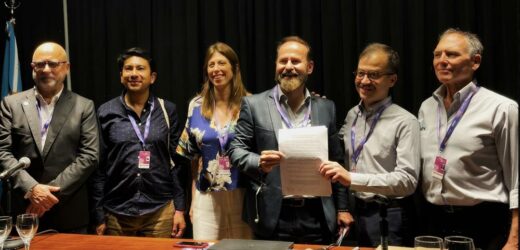BUENOS AIRES — A Ventana Sur industry panel highlighting the importance of the regional and global alliance among Spanish-speaking countries preceded the signing of a treaty between Spain Film Commission president Carlos Rosado and delegates from Argentina, Brazil, Colombia, and Costa Rica to ensure continued mutual support for their respective audiovisual sectors.
“I think a synergy like the one we have here in Ibero-America is also an opportunity to strengthen our industries so that we have an even more powerful audiovisual sector and can compete with developed markets,” said Luiz Toledo, director of investments & strategic partnerships at Brazil’s Spcine. “There’s a lot of work to be done, but I believe that having the support of partners is essential for us to create real change in our industry.”
The panel spoke to financial obstacles, and each panelist was keen on mentioning current incentives, which make it far more lucrative for projects to choose Latin America. Toledo and Sol Mayoral, director of the Buenos Aires Film Commission, touted their São Paulo and Buenos Aires city-specific rebates, which they hope will encourage future production appeal.
“We’re happy that we were able to launch rebates this year, to put us on an equal footing with several of our colleagues here today, we want to make the whole region more attractive,” relayed Mayoral.
Ensuring talent remains local by building robust training platforms was also discussed as Ricardo Cantor Bossa, film commissioner, Bogotá Film Commission, mentioned Colombia’s efforts to solidify the region’s success.
“We’ve worked hard on the qualification of professionals with the participation of foreign professionals, both Latin American, North American and European. That not only strengthens us as local audiovisual service providers, but increases the quality of local production, national intellectual production, so that what we produce can travel around the world,” he stated.
The peers explored how strong partnerships between Spain and Latin America can ensure that Latin American content, oft-stifled in the production and global distribution phase, is procured regionally as demand for Spanish-language entertainment grows.
“I think we should look for more co-production and writing between our countries. There’s a lot to tell. From the times of the Conquest to the current migration. So many stories to tell, and we’re leaving them out there because we don’t sit down to write together,” said José Castro, Film Commissioner, Costa Rica Film Commission. “I think it’s interesting the thousands of stories that can come out of linking two or three parallel countries, and I think that would also make them stronger.”
“We know how often original content, in Spanish and Portuguese, has reached the top of the charts on the platforms. That means that Latin America, definitely Ibero-America, is generating very high quality content,” Castro added.
He went on: “We need to stop 100% of Spanish-language content coming solely from North America. When the teams come to the market and content producers in the U.S. tell our stories…we need our stories told by us, produced by us and brought to the screens, the big platforms.”
Before representatives gathered to sign the agreement, moderator Steve Solot, president of the Latin American Training Center, surveyed the substantial audience in the auditorium for curious members and fielded a single question on Indigenous representation and diversity within the Ibero-American audiovisual sector.
“In the case of Colombia, the Fund for Cinematographic Development has created specific lines of support for the development of audiovisual narratives made by the native peoples themselves, and film festivals have also grown and strengthened, committed to generating processes for the circulation of audiovisual productions by ethnic groups, not only Indigenous, but also Afro-descendants,” answered Cantor.
Toledo added, “The Indigenous population of native Brazil is very large and very important. We’ve created a policy of affirmative action, to promote the participation of more Indigenous people. Everything we do, from financing local production to training for individuals, we pay more attention to the Indigenous population.”
The abbreviated session wrapped as delegates signed an agreement to solidify the ongoing partnership between Spain, Latin American and Caribbean Film Commissions. The arrangement will further bolster incentives to work towards a shared goal of broadly promoting regional storytelling and production, using strong talent networks to take advantage of a vast market that yearns for Spanish-language content.
Objectives of the memorandum, which expires in November 2024, include promoting the early production of audiovisual projects, remaining dedicated to advocating for Latin American locations and maintaining strong lines of communication while sharing best practices and developing strategies that stimulate the sector.
The delegates also pledged to facilitate dialogue and industry associations related to the production sector, opening lines of communication regarding training and the adaptation to the ever-evolving digital environment.
Finally, they’ll seek to extend the Ibero-American pact to Portugal and boost the presence and relevance of the Latin American and Spanish commissions in international publishing organizations.
“We’ve been entrusted by the government to contribute in making Spain an audiovisual hub in Europe. That’s precisely the act we’re celebrating today, solidifying the power of Latin America,” Rosado relayed. “The audiovisual world is not only Anglo-Saxon, it’s an Ibero-American world, a Latin American world.”
Read More About:
Source: Read Full Article


